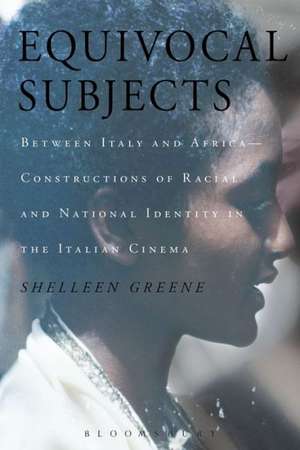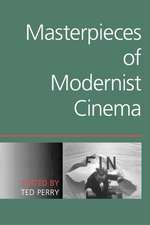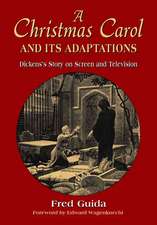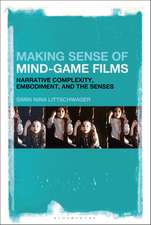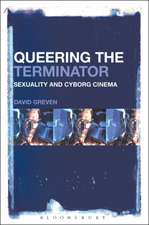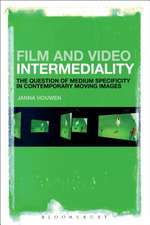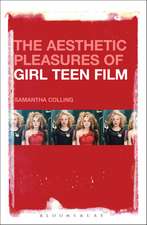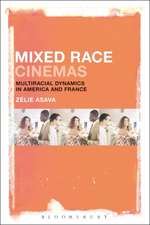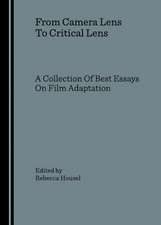Equivocal Subjects: Between Italy and Africa -- Constructions of Racial and National Identity in the Italian Cinema
Autor Shelleen Greeneen Limba Engleză Paperback – 21 mai 2014
| Toate formatele și edițiile | Preț | Express |
|---|---|---|
| Paperback (1) | 259.79 lei 43-57 zile | |
| Bloomsbury Publishing – 21 mai 2014 | 259.79 lei 43-57 zile | |
| Hardback (1) | 702.93 lei 40-51 zile | |
| Bloomsbury Academic – 30 apr 2012 | 702.93 lei 40-51 zile |
Preț: 259.79 lei
Preț vechi: 297.31 lei
-13% Nou
Puncte Express: 390
Preț estimativ în valută:
49.71€ • 52.03$ • 41.38£
49.71€ • 52.03$ • 41.38£
Carte tipărită la comandă
Livrare economică 31 martie-14 aprilie
Preluare comenzi: 021 569.72.76
Specificații
ISBN-13: 9781472535214
ISBN-10: 1472535219
Pagini: 328
Ilustrații: 12 bw illus
Dimensiuni: 152 x 229 x 23 mm
Greutate: 0.48 kg
Editura: Bloomsbury Publishing
Colecția Bloomsbury Academic
Locul publicării:New York, United States
ISBN-10: 1472535219
Pagini: 328
Ilustrații: 12 bw illus
Dimensiuni: 152 x 229 x 23 mm
Greutate: 0.48 kg
Editura: Bloomsbury Publishing
Colecția Bloomsbury Academic
Locul publicării:New York, United States
Caracteristici
Opens up new scholarship surrounding Italy's place in Europe and its problems with immigration
Notă biografică
Shelleen Greene is Associate Professor, Department of Art and Design, at the University of Wisconsin, Milwaukee, USA.
Cuprins
INTRODUCTION Chapter One: From "Making Italians" to Envisioning Postcolonial ItalyChapter Two: Mixed-Race Relationships in the Italian Colonial and Postcolonial Imaginary...... Chapter Three: Negotiations of Interracial Identity and Citizenship in the Post-War Cinema and Beyond Chapter Four: Transatlantic Crossings: Representing Hierarchies of Whiteness in the Cinema of the Economic Miracle Chapter Five: Zumurrud in her Camera: Pier Paolo Pasolini and the Global South in Contemporary Italian Film CONCLUSIONFilmographyBibliographyIndex
Recenzii
Equivocal Subjects is an important and innovative piece of scholarship. It offers new and much needed insight into Italian cinema and its histories of race. Equally challenging perhaps is its insistence on 'Italy as a site of African diasporic identity formation.' Greene's focus on the mixed-race subject revises the history of Italian cinema, and suggestively re-routes the contours of overly familiar geographies of racial difference.
Greene's illuminating book draws on an impressive range of sources to explore the intersecting constructions of race and nation in Italian cinema over the course of a century. Combining historical analysis with close readings of landmark films, this persuasively argued account makes a pathbreaking contribution to Italian film studies.--Áine O'Healy, Professor of Italian and Director of the Humanities Program, Loyola Marymount University, USA
Highlighting Italy's own internal racialisation of the Italian South and Italians' ascribed racial in-betweenness, Greene brilliantly highlights the contextual and precarious nature of racial identities and categorisation. She makes a compelling argument about how 'mixed-race' is a particularly unique lens through which to investigate ideologies of race and nation in Italy.
Equivocal Subjects offers many starting points of discussion to better understand Italian and mixed-Italian identities and creates a global and exhaustive overview of their depiction in visual communication. Well-written, fluid and never boring, the book underscores the author's passion and her strong emotional involvement with mixed-race issues.
Greene's text assumes that scholars of both Italian studies and film studies will accept the heuristics of reading Italian culture and its postcolonial inheritance through the lens and in the context of film, rather than exploring the possible problematics in such an approach. While some scholars may disagree with that assumption on the theoretical level, Greene's study nonetheless provides either school with valuable facts and analyses and is a solid groundwork for either discipline.
Greene's illuminating book draws on an impressive range of sources to explore the intersecting constructions of race and nation in Italian cinema over the course of a century. Combining historical analysis with close readings of landmark films, this persuasively argued account makes a pathbreaking contribution to Italian film studies.--Áine O'Healy, Professor of Italian and Director of the Humanities Program, Loyola Marymount University, USA
Highlighting Italy's own internal racialisation of the Italian South and Italians' ascribed racial in-betweenness, Greene brilliantly highlights the contextual and precarious nature of racial identities and categorisation. She makes a compelling argument about how 'mixed-race' is a particularly unique lens through which to investigate ideologies of race and nation in Italy.
Equivocal Subjects offers many starting points of discussion to better understand Italian and mixed-Italian identities and creates a global and exhaustive overview of their depiction in visual communication. Well-written, fluid and never boring, the book underscores the author's passion and her strong emotional involvement with mixed-race issues.
Greene's text assumes that scholars of both Italian studies and film studies will accept the heuristics of reading Italian culture and its postcolonial inheritance through the lens and in the context of film, rather than exploring the possible problematics in such an approach. While some scholars may disagree with that assumption on the theoretical level, Greene's study nonetheless provides either school with valuable facts and analyses and is a solid groundwork for either discipline.
